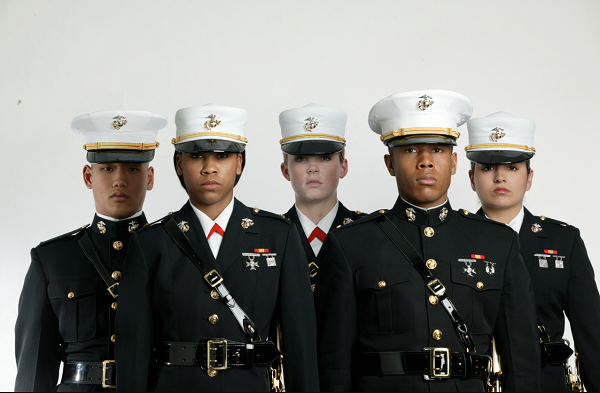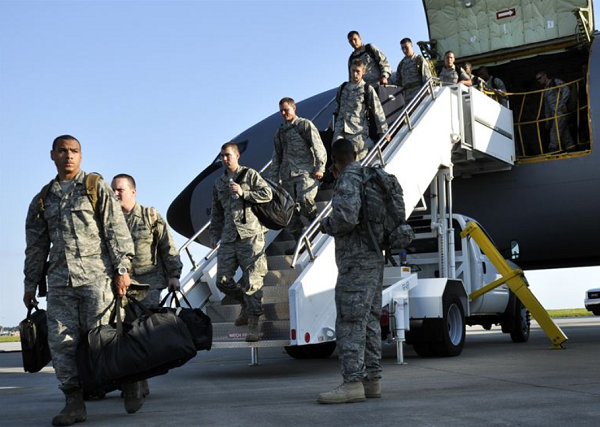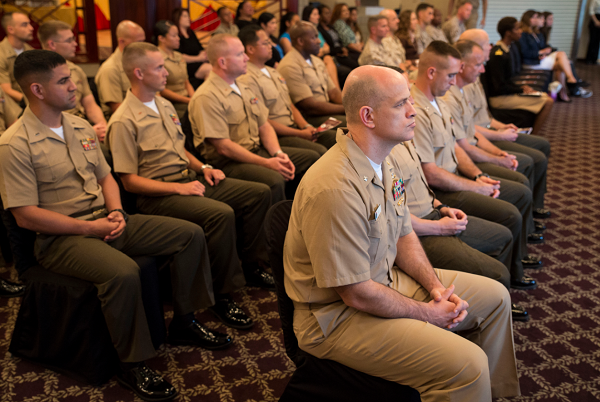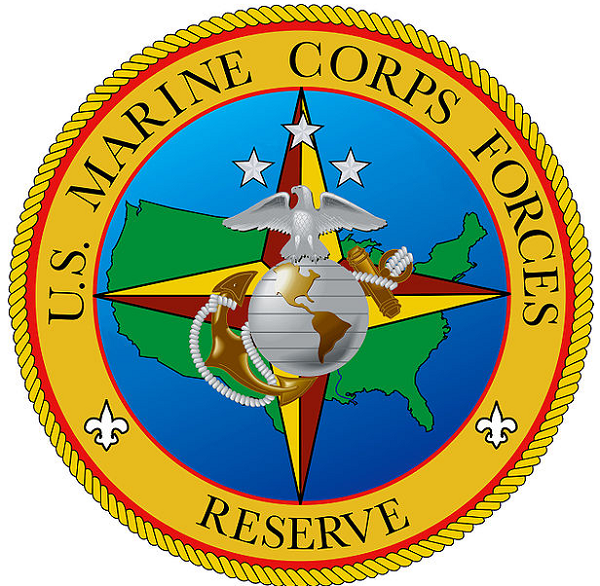Thinking about joining the Marine Corps Reserves?
Unsure about what they pay is like or what the benefits of joining are?
Marine Corps Active Reserve members work one weekend a month, plus an additional two weeks a year for training.
It is difficult to find a civilian part-time employment opportunity that offers the benefits and opportunities the Reserves provides.
Related Article – 13 Pros And Cons Of Joining The Marines
Below you will find a list of five Marine Corps benefits afforded to Reserve members.
This list is not exhaustive but gives an inside preview to the resources and advancement opportunities available.
Jump To A Section
1. Pay
One of the benefits of joining the Marine Corps Reserve is the ability to keep your civilian job or attend school, plus earn additional income.
The Marine Corps Reserves provides drill pay that is based on rank and time in service.
When attending drill, you receive a set amount per each drill period.
On an average weekend for reservists, there are four drilling periods.
When completing annual two-week training, reservists are paid the same as active duty members of the same rank.
Drill pay starts at $51.80 for individuals who join with no prior military experience or education, during the first four months.
Related Article – Army Reserves Vs. National Guard
The Marine Corps also offers bonuses and special pay opportunities that add to drill pay.
Bonuses change depending on the needs of the Marine Corps, but if you qualify for one, it can provide you with up to a few thousand dollars extra in your pocket.
Also, whenever active duty enlisted members receive raises, such as cost of living, reservists receive the raise as well.
Reserve pay for the Marine Corps can be found here.
2. Officer Opportunities

The Marine Corps provides many opportunities for Reserve members to complete commissioning as an officer.
There are many benefits to completing school and becoming an officer.
Not only does your pay/rank increase, you have new leadership skills, opportunities for higher retirement/earlier retirement, and other benefits.
Upon completion of Officer Candidate School, individuals will be commissioned as a Second Lieutenant.
Related Article – Joining The Military After College: How To Do It The “Right” Way
Reserve Enlisted Commissioning Program (RECP)
This program is available to those in the Selected Marine Corps Reserve (SMCR).
Those who wish to join the program must apply to Officer Candidates School.
Requirements include having a Bachelor’s degree and being less than 30 years old.
Meritorious Commissioning Program
Meritorious Commissioning Program is open to those in the Corps and in the Marine Corps Active Reserve (AR) Program.
To enter into this program, reservist must be nominated by a commanding officer.
Requirements for this program include having at least 75 college credits or an associates degree.
Warrant Officer Reserve Program
The Warrant Officer Reserve Program is open to Sergeant or above who has at least 8 years of service and has been in the SMCR/IMA for one year or more.
The requirements include possessing endorsements, having qualifying test scores, and more.
The application process and qualifications can be found here.
Opportunities for Reserve officers to expand their knowledge are available through the College of Distance Education and Training. Details can be found below in the CDET Weekend Seminars section.
Related Article – Army Reserve Benefits
3. Space-A Flights

When Military members are on active duty they have the ability to fly on space-a flights.
What this means is that whenever there are Department of Defense aircraft seats that are left over after all of the space-required passengers have been accounted for, you can use them for personal travel.
Generally, these flights are available to both Military members and their spouses/dependents, but there are restrictions for Reserve members.
Reserve members may use space-a flights with their identification and DD Form 1853.
Reservists can fly to and from Alaska, Puerto Rico, Guam, Hawaii, the Virgin Islands, American Samoa and in the Continental United States (also referred to as CONUS).
This opportunity is generally free and allows you to take advantage of free travel whenever you go on vacation.
Unfortunately, this privilege only applies to Reserve members, not their dependents.
Whenever a Reserve member is placed on active duty for over 30 days, dependents are eligible to use this benefit as well.
Also, Reserve members who are placed on active duty can fly anywhere in the US, or outside of the US.
Related Article – 10 Benefits Of Being A Military Wife (and 5 not-so good things)
4. USMAP
USMPAP, or United Services Military Apprenticeship Program, is an opportunity for Marine Corps Reserve members to receive an apprenticeship while training for their MOS.
An apprenticeship through USMAP does not usually require off-duty hours and is free to service members.
It will result in documented proof of completion.
What is USMAP?
USMAP is a Department of Labor (DOL) sponsor.
The Department of Labor administers the National Apprenticeship System, which is recognized by civilian employers all around the United States.
USMAP uses a set standard written by the DOL and then tailors the standard to fit the military mission.
Who is eligible?
To be eligible to participate in USMAP individuals must be active duty or Reserve members with a minimum of one year left on current enlistment.
A high school diploma or GED is required and they must be both assigned an MOS and performing the job duties of that MOS as part of your primary job, not a temporary duty.
Related Article – Marine Corps MOS List and ASVAB Scores: Details Of All 123 Jobs
What are the requirements to receive a certificate?
Apprenticeship programs are based around your MOS.
You can only complete an apprenticeship program in the area that your work surrounds.
Apprenticeship programs can vary between 2,000 and 8,000 hours.
To complete the 2,000 hours required each year, 144 hours of apprenticeship training is required.
Individuals are required to complete formal classroom instruction and on the job training in order to meet this demand.
Usually, MOC training meets the requirement of formal classroom instruction.
Once Marines complete training and perform job functions of their job, they can log on the job training.
The apprenticeship program will outline a list of tasks that need to be completed, called a Work Processes Schedule.
Once all of these requirements are met, a certificate of completion will be awarded.
The certificate is from a federal agency that shows documented proof of work experience and assists with acquiring civilian jobs.
Related Article –Marine Corps Firefighters (MOS 7051): Career Details
5. CDET Weekend Seminars

Marine Corps University has nine Professional Military Education (PME) programs, of which College of Distance Education and Training (CDET), is one.
CDET provides distance education programs that are accessible around the world through the use of their online learning system (MarineNet), learning resource centers and seminars.
The programs provided by CDET allow reserve individuals to expand their knowledge and become prepared leaders.
This benefit is convenient for reserve members because it allows individuals to make recommendations on times that work best for them and attend classes on the weekend, attend during the evenings, or do a combination of online/in person classes.
Also, for reserve marines, weekend seminars are fully funded by Marine Forces Reserve.
Registration for these programs is first-come, first-serve, and must meet certain requirements and deadlines in order to register.
Current programs listed include:
- Expeditionary Warfare School- Open to Captains and chief warrant officers (open to lower ranks if space is available), with different courses aimed to increase capabilities
- Command and Staff College- Open to majors and chief warrant officers (open to lower ranks if space is available), to increase knowledge of history and culture
- Sergeants School Seminar Program- After completing online MarineNet courses, this program teaches sergeants how to serve as ethical leaders, professional war-fighters and sound decision-makers
- Career School Seminar Program- Open to staff sergeants and staff sergeant selects who have completed online MarineNet courses; teaches individuals how to be ethical leaders, professional war-fighters and sound decision-makers
- Advanced School Seminar Program- After completing online MarineNet courses, gunnery sergeants and gunnery sergeant selects learn to translate policy into action, improve communication and decision-making skills
Related Article – American Military University (AMU) Reputation: Worth It? (Review)
Reserve Benefits
Joining the reserves, regardless of the branch has benefits.
While some benefits are unique to certain military branches, there are universal benefits that can be used in all active reserves.
Benefits:
- Low-cost life insurance
- Civilian job protection
- Education assistance services
- Drill pay
- TRICARE Insurance
- Direct Deposit
Conclusion
The Marine Corps Reserves offers a chance to improve yourself as both a Marine and a civilian.
Benefits discussed above include pay, officer opportunities, space-a flights, USMAP and CDET Weekend Seminars.
By providing opportunities at officer commissioning and leadership improvement skills, the Marine Corps turns reservist into valuable assets that are desired by both the Marine Corps and the civilian career workforce.
Marine Corps Reserve benefits do not just improve your technical and leadership skills, they aim to keep your mental health happy as well with opportunities to fly home to visit your family, for free.
Understanding the benefits and potential of the reserve program can help make an informed decision on joining.
Related Article – Marine Corps Tattoo Policy
References
- Marine Corps Boot Camp Schedule - June 20, 2024
- What To Bring To Marine Boot Camp - June 20, 2024
- Marine Corps Promotion Timeline for Enlisted & Officers - June 19, 2024

